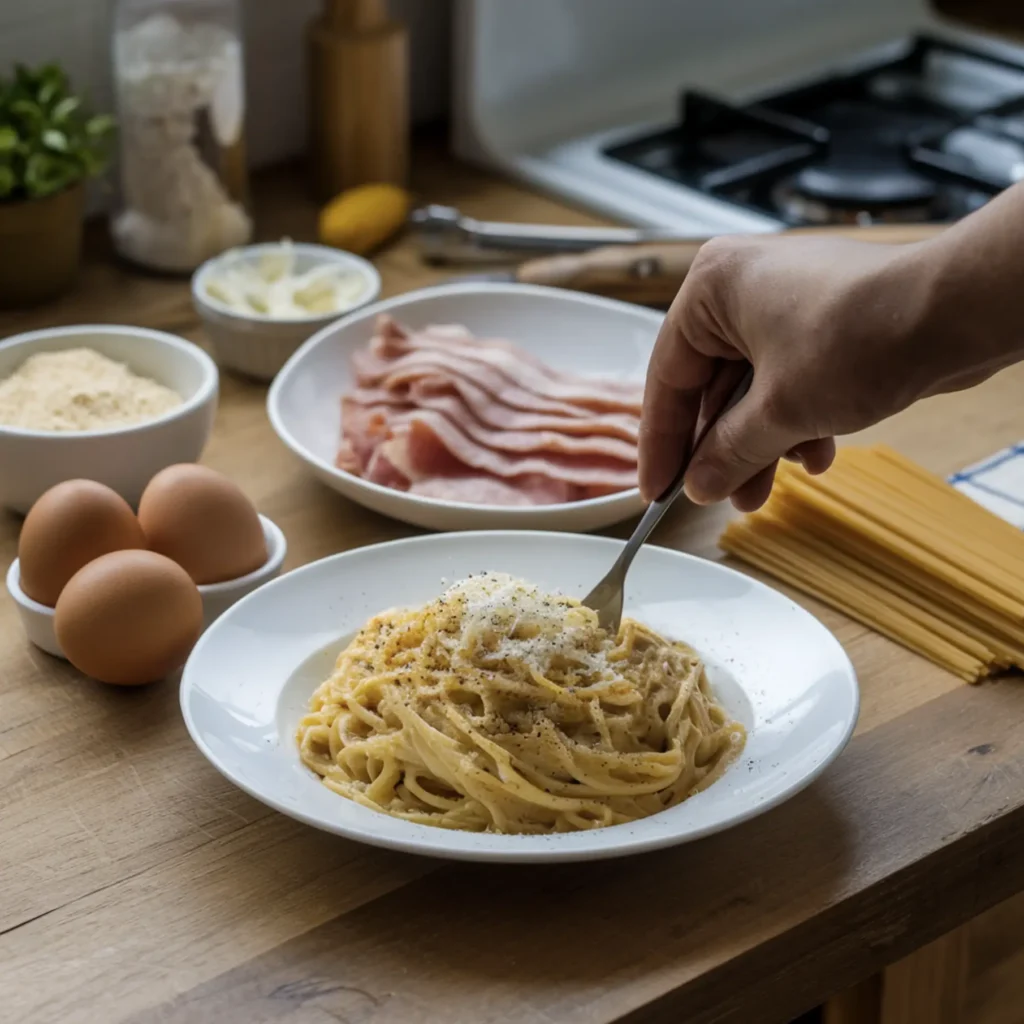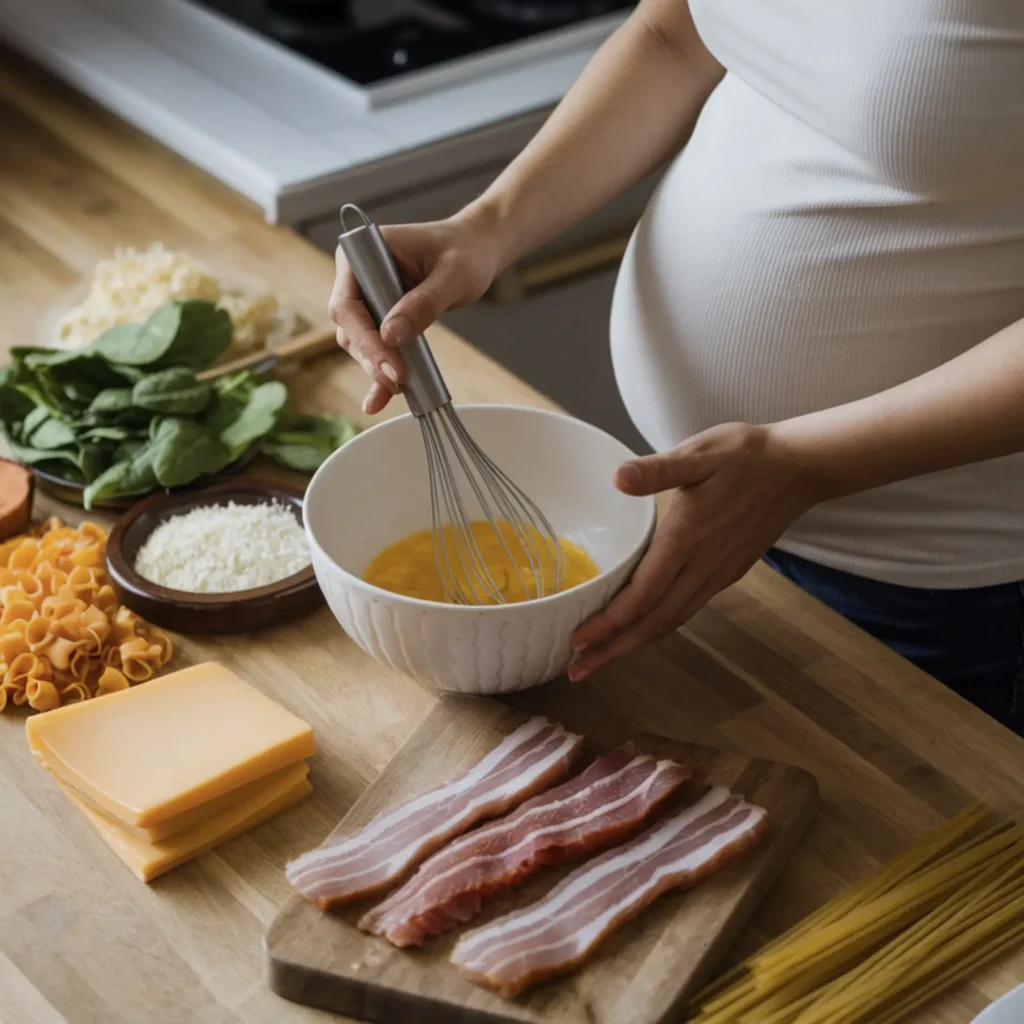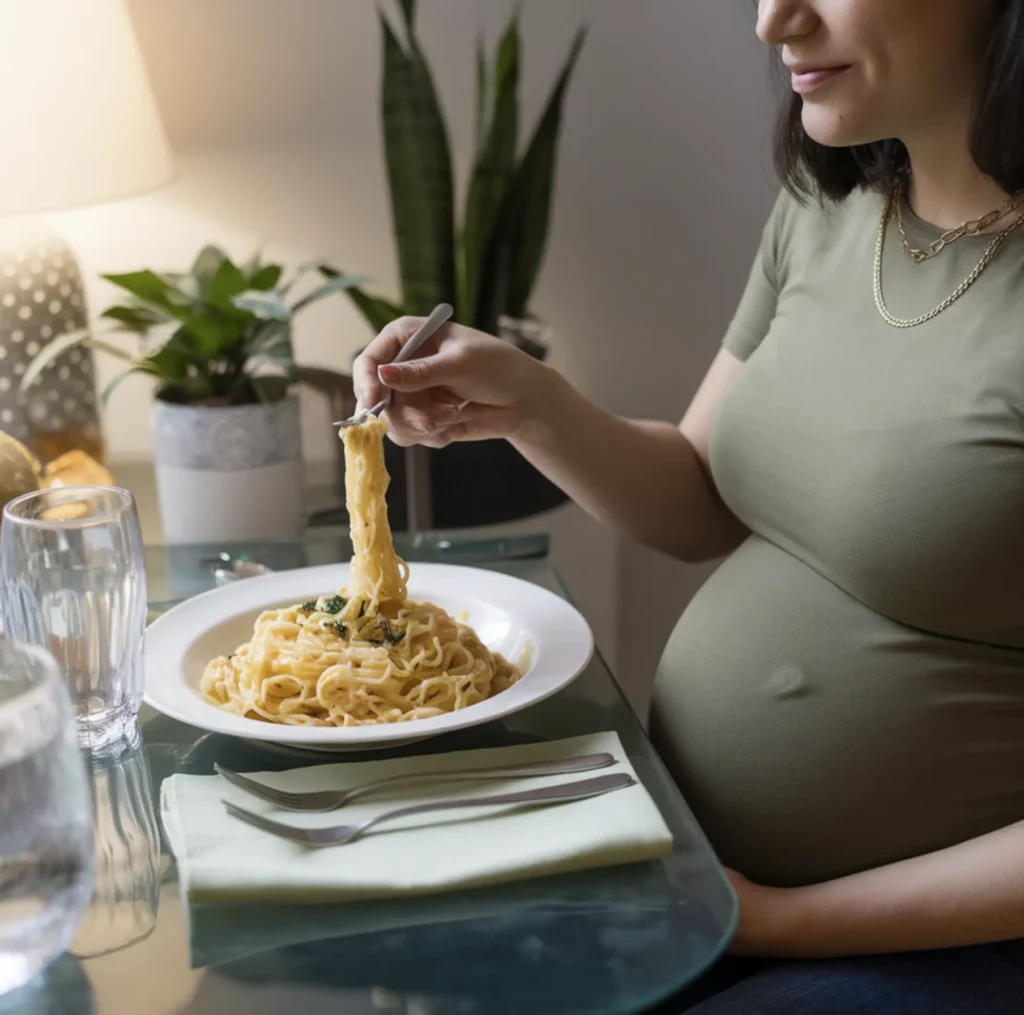Spaghetti carbonara is cherished by food lovers around the globe for its simplicity and robust flavors. Above all, it’s a dish steeped in Italian tradition, featuring a creamy sauce created with eggs, cheese, and cured meat. However, this raises an important question: Is spaghetti carbonara safe for pregnant women? While the dish is undoubtedly delicious, concerns about certain ingredients often arise during pregnancy.
In this comprehensive guide, we will not only address these concerns but also offer tips, variations, and detailed preparation steps to make carbonara both delicious and safe for expecting mothers. If you’re curious about exploring more Italian-inspired dishes, why not try this Seafood Pasta Recipe? It’s a delightful alternative that pairs beautifully with Italian flavors.
Understanding the Ingredients: Is Spaghetti Carbonara Safe for Pregnant Women?
Spaghetti carbonara is a simple yet flavorful Italian dish. It typically includes:
- Spaghetti: The base with a firm texture.
- Eggs: Create the dish’s creamy sauce.
- Cured Meats: Like pancetta, adding smoky depth.
- Cheese: Hard cheeses such as Parmesan or pecorino Romano provide sharpness.
- Black Pepper: Adds warmth and enhances the dish.
When asking, “Is spaghetti carbonara safe for pregnant women?” certain ingredients need special attention. Raw eggs may carry salmonella, and uncooked cured meats can harbor listeria. However, using pasteurized eggs and cheese, along with thoroughly cooked meats, ensures safety.
To make it more nutritious, consider whole-grain spaghetti or adding vegetables like zucchini. By understanding the ingredients and preparing them safely, pregnant women can enjoy carbonara without worry.
Eggs in Spaghetti Carbonara
Eggs are central to carbonara’s creamy texture, but raw or undercooked eggs can carry salmonella, a risk during pregnancy. Pasteurized eggs are the safest choice and should be cooked to at least 160°F to eliminate bacteria.
Not only are eggs key to flavor, but they also provide nutrients like protein and choline, essential for fetal brain development. Using the residual heat of the pasta to gently cook the eggs ensures both safety and the dish’s velvety texture.
In short, when handled properly, eggs make spaghetti carbonara both safe and nutritious for expecting mothers.
Cured Meats and Their Safety
Cured meats like pancetta add savory depth to carbonara but can carry listeria if not fully cooked. To ensure safety, cook them until crispy and heated to 165°F.
For alternatives, turkey bacon or mushrooms can replicate the flavor without the risks. Adding vegetables like spinach or zucchini balances the dish and boosts nutrition.
With proper preparation, cured meats can be safely enjoyed in spaghetti carbonara during pregnancy.
Is Spaghetti Carbonara Safe for Pregnant Women? Exploring Safety for Expecting Moms

Spaghetti carbonara is a beloved Italian dish made with spaghetti, eggs, cured meats, cheese, and black pepper. While delicious, its safety for pregnant women depends on how these ingredients are prepared.
Raw or undercooked eggs, often used in traditional recipes, may carry salmonella, a bacteria that poses a risk during pregnancy. To avoid this, pasteurized eggs should be used, and they must be cooked thoroughly—at least 160°F—to ensure safety. Eggs also provide essential nutrients like protein and choline, making them a healthy choice when handled properly.
Cured meats like pancetta, another key ingredient, can harbor bacteria such as listeria if not fully cooked. Cooking the meat until crispy and heated to 165°F eliminates these risks. For a safer twist, alternatives like turkey bacon or mushrooms offer similar savory notes.
Cheese, especially hard types like Parmesan or pecorino Romano, is generally safe if made from pasteurized milk. Always check the label to confirm pasteurization.
By using fresh, high-quality ingredients, pasteurized products, and proper cooking techniques, spaghetti carbonara can be enjoyed safely during pregnancy. For added nutrition, try whole-grain pasta or mix in vegetables like spinach or zucchini.
In summary, with a few adjustments, this classic dish can be both a delicious and pregnancy-safe option.
Nutritional Benefits of Spaghetti Carbonara: Is Spaghetti Carbonara Safe for Pregnant Women?
When asking, “Is spaghetti carbonara safe for pregnant women?” it’s worth noting that, beyond safety, the dish can offer significant nutritional benefits when prepared correctly. Whole-grain pasta, for example, provides an excellent source of dietary fiber, which can alleviate common pregnancy issues like constipation and support overall digestive health. Carbohydrates in the pasta also serve as an important energy source, helping to combat the fatigue many expecting mothers experience.
Pasteurized eggs and cheese are rich in protein and calcium, both of which are vital for the baby’s growth. Protein aids in developing fetal tissues, while calcium strengthens bones and teeth for both mother and child. Not only that, but turkey bacon or plant-based substitutes can add lean protein, which is lower in fat yet still nutrient-dense.
Moreover, incorporating vegetables such as spinach or broccoli into the dish enhances its nutritional value even further. Spinach, for instance, is high in folate, a critical vitamin for preventing neural tube defects in the baby. Broccoli, on the other hand, provides iron and vitamin C, which support healthy blood production and immune function.
Above all, preparing spaghetti carbonara with these adjustments ensures that it’s not just a tasty treat but also a nutrient-packed meal. By balancing protein, carbohydrates, vitamins, and minerals, expecting mothers can enjoy carbonara while supporting their overall health and the development of their baby.
Step-by-Step Recipe: Is Spaghetti Carbonara Safe for Pregnant Women?

If you’re wondering, “Is spaghetti carbonara safe for pregnant women?” this modified recipe ensures it’s both safe and delicious for expecting mothers. With carefully chosen ingredients and simple steps, you can create a dish that satisfies cravings while adhering to pregnancy guidelines.
Ingredients
- 400g whole-grain spaghetti
- 2 large pasteurized eggs
- 1 large pasteurized egg yolk
- 100g Parmesan cheese (pasteurized), grated
- 100g turkey bacon or vegetarian alternative, diced
- 2 tablespoons olive oil
- Freshly ground black pepper
Preparation Instructions
Step 1: Cook the Spaghetti
Boil salted water in a large pot and cook the spaghetti until al dente for the perfect texture. Reserve one cup of pasta water before draining to use later in the sauce.
Step 2: Prepare the Sauce
Whisk together the pasteurized eggs, egg yolk, and grated cheese in a bowl until smooth. Add a generous pinch of freshly ground black pepper for extra flavor.
Step 3: Cook the Meat
Heat olive oil in a skillet and cook the turkey bacon or vegetarian alternative until crispy. If you prefer a meat-free version, sauté mushrooms instead for a savory depth.
Step 4: Combine Ingredients
Add the hot, drained spaghetti to the skillet with the cooked meat. Remove the skillet from heat and gradually stir in the egg mixture. Add reserved pasta water, a little at a time, to create a creamy, smooth sauce.
Step 5: Serve and Enjoy
Top with extra grated cheese and black pepper. Serve immediately to savor the dish at its best, with all the flavors melding perfectly.
By following these steps, you can enjoy spaghetti carbonara confidently and safely during pregnancy.
How to Safely Store and Reheat Carbonara
Proper storage and reheating play a crucial role in answering, “Is spaghetti carbonara safe for pregnant women?” You can safely enjoy leftovers by handling them with care. Cool any uneaten portions promptly, and store them in an airtight container. Refrigerate them within two hours to prevent bacterial growth, and consume the dish within 1–2 days to maintain maximum freshness and safety.
When reheating, the stovetop is the best option to maintain the dish’s creamy texture. Place the carbonara in a pan over low heat, adding a splash of water or broth to prevent it from drying out. Stir frequently to ensure even heating. Alternatively, you can use a microwave, but ensure the carbonara reaches an internal temperature of 165°F for safety. Stir halfway through to heat the dish evenly.
It’s important to note that reheating carbonara more than once is not recommended, as this increases the risk of bacteria. Consequently, reheating leftovers properly ensures both flavor and safety are preserved. By following these guidelines, you can confidently enjoy carbonara even after storing it.
Creative Variations of Spaghetti Carbonara
When exploring the question, “Is spaghetti carbonara safe for pregnant women?” you may find that creative variations of the dish cater to different dietary preferences while maintaining safety. By substituting or adding ingredients, you can adapt carbonara to suit specific needs without compromising flavor.
Vegetarian Carbonara
For a meat-free option, replace pancetta with sautéed vegetables like mushrooms, zucchini, or spinach. Not only do these ingredients replicate the savory depth of cured meats, but they also add nutrients such as fiber, potassium, and vitamins A and C. Mushrooms offer an earthy flavor, while spinach brings a mild, sweet taste that blends seamlessly with the creamy sauce. This variation is ideal for pregnant women seeking a plant-based alternative that’s equally satisfying and nutritious.
Seafood Carbonara
Seafood can provide a protein-rich alternative to traditional carbonara. For instance, cooked shrimp or chunks of white fish pair beautifully with the creamy egg-based sauce, adding a sophisticated twist. Shrimp is high in omega-3 fatty acids, which support fetal brain development, making it an excellent choice for expecting mothers. Be sure the seafood is fully cooked to eliminate any risks associated with raw or undercooked fish.
Low-Fat Carbonara
To reduce the dish’s fat content, replace cheese with low-fat ricotta or plain yogurt. These alternatives still provide a creamy texture while cutting calories and saturated fat. Additionally, using whole-grain spaghetti boosts the dish’s fiber content, supporting digestion during pregnancy. A dash of olive oil can enhance flavor while keeping the recipe heart-healthy.
In conclusion, these creative variations ensure that spaghetti carbonara remains versatile, safe, and delicious for pregnant women. By adjusting ingredients, you can tailor the dish to suit your preferences and nutritional needs.
Tips for Making Carbonara Kid-Friendly
Pregnancy often requires planning family meals, and many people ask, “Is spaghetti carbonara safe for pregnant women and children?” With a few tweaks, you can adapt this dish to appeal to younger palates while maintaining its nutritional value.
For instance, swap Parmesan for a milder cheese like mozzarella to accommodate children who prefer gentler flavors. Similarly, incorporating finely chopped vegetables such as carrots, peas, or even bell peppers can add natural sweetness and valuable nutrients like vitamin A and folate. These additions not only enhance the dish’s nutritional profile but also encourage children to eat more vegetables.
On the other hand, reducing the amount of black pepper can make the dish less spicy and more kid-friendly. For younger or picky eaters, presenting the pasta in a playful way—such as twirling it into small nests or serving it with fun-shaped breadsticks—can make mealtime more engaging. You could even experiment with adding a dollop of tomato sauce for a mild, tangy twist that kids might enjoy.
In conclusion, spaghetti carbonara can be easily transformed into a family-friendly favorite. By making small adjustments to the ingredients and presentation, this classic dish becomes a meal that both pregnant women and their children can safely enjoy.
Why Homemade Carbonara is a Better Choice for Pregnant Women

For pregnant women wondering, “Is spaghetti carbonara safe for pregnant women?” homemade versions are often the safest and healthiest choice. When you prepare carbonara at home, you have complete control over the ingredients and cooking methods, which is crucial for ensuring food safety during pregnancy.
For example, at home, you ensure the use of pasteurized eggs and cheese and thoroughly cook cured meats like turkey bacon or pancetta. These measures significantly reduce the risks of foodborne illnesses, such as salmonella or listeria, which raw or undercooked ingredients in restaurant dishes can often cause.
Moreover, homemade carbonara allows for personalization. You can adjust the recipe to reduce sodium levels, use whole-grain pasta for added fiber, or incorporate nutrient-dense vegetables like spinach, zucchini, or broccoli. In contrast, restaurant versions may include hidden additives or preservatives, and their preparation standards may not always meet pregnancy-safe guidelines.
As a result, preparing carbonara at home enhances its safety and boosts its nutritional value. By making this classic dish in your own kitchen, you tailor it to meet your dietary needs while enjoying its creamy, comforting flavors with peace of mind.
Common Mistakes to Avoid in Carbonara Preparation
Carbonara is a deceptively simple dish, but even minor missteps can affect its flavor, texture, and safety. When wondering, “Is spaghetti carbonara safe for pregnant women?” avoiding these common mistakes is key to ensuring a delicious and worry-free meal:
- Scrambled Eggs: One of the most common pitfalls in carbonara preparation is scrambling the eggs. This happens when the egg mixture is poured over pasta that is too hot or added directly on high heat. To avoid this, mix the eggs with the pasta off the heat, allowing the residual warmth to create a smooth, creamy sauce.
- Insufficient Cooking: Cured meats like turkey bacon or pancetta must be thoroughly cooked to eliminate any potential bacteria. Undercooking not only compromises flavor but also poses health risks, particularly for pregnant women. Cook the meat until it’s crispy and golden brown to ensure both safety and taste.
- Too Much Salt: Hard cheeses and cured meats are naturally salty. Over-seasoning the dish can overwhelm the palate. Taste as you go and use salt sparingly, especially if you’re adding vegetables or other ingredients that enhance the dish’s overall balance.
- Skipping Pasta Water: Reserved pasta water is crucial for achieving the signature creamy texture of carbonara. Its starchy consistency helps emulsify the sauce, making it cling to the pasta. Skipping this step can result in a dry, less cohesive dish.
By keeping these tips in mind, you can prepare carbonara that’s both flavorful and safe for pregnancy. Each step ensures the dish retains its classic appeal while addressing the question, “Is spaghetti carbonara safe for pregnant women?”
FAQs
What Is Spaghetti Carbonara?
Guanciale is a type of Italian cured meat that has a richer, more intense flavor, making it the preferred choice for traditional Carbonara. Its unique texture and savory taste contribute to a deeper, more complex flavor profile. On the other hand, pancetta has a milder flavor and a firmer texture, which makes it a more subtle choice for the dish.
What’s the Difference Between Pancetta and Guanciale in Carbonara?
Guanciale is a type of Italian cured meat that has a richer, more intense flavor, making it the preferred choice for traditional Carbonara. Its unique texture and savory taste contribute to a deeper, more complex flavor profile. On the other hand, pancetta has a milder flavor and a firmer texture, which makes it a more subtle choice for the dish.
How Do I Make Spaghetti Carbonara Without Scrambling the Eggs?
The key to preventing scrambled eggs is to remove the pan from the heat before adding the egg mixture. Additionally, toss the pasta quickly and continuously to ensure that the eggs don’t cook too quickly. Adding pasta water gradually helps create a smooth sauce without scrambling the eggs. In short, it’s important to combine the ingredients while the pasta is still hot but not too hot, so the eggs can cook gently and emulsify into the sauce.
Can I Make Carbonara Without Parmesan Cheese?
Yes, you can use Pecorino Romano instead of Parmesan, as it is the traditional cheese used in Carbonara. Pecorino has a sharper, saltier taste compared to Parmesan, which adds a distinctive flavor to the dish. However, if you prefer a milder flavor, you can opt for Parmesan instead. In fact, some people mix both cheeses for a balanced, flavorful sauce.
Get the Classic Spaghetti Carbonara Recipe Now!
Ready to make the ultimate Italian dish? Dive into our step-by-step guide to making Classic Spaghetti Carbonara that’s as authentic as it gets! 🍝
From selecting the right ingredients to perfecting the sauce, we’ve got everything you need to create this timeless favorite. Start cooking the perfect Carbonara today, and bring a taste of Italy to your kitchen!
Conclusion
In conclusion, spaghetti carbonara is a delightful and versatile dish that can be safely enjoyed during pregnancy with proper preparation. By using pasteurized eggs and cheese, thoroughly cooking cured meats, and managing ingredients carefully, this classic favorite becomes a worry-free meal.
Moreover, incorporating pregnancy-safe variations such as turkey bacon or vegetarian options, along with balanced sides like roasted vegetables or a fresh salad, enhances both its appeal and nutritional value. For instance, An Italian in My Kitchen provides excellent insights into making carbonara authentically while allowing for personalized tweaks.
Whether you stick to the traditional recipe or explore creative alternatives, you can easily make carbonara a cherished part of your pregnancy diet. When you prepare it thoughtfully, you can confidently answer the question, “Is spaghetti carbonara safe for pregnant women?” Yes, with care and attention, this dish becomes a safe and delicious choice. For additional recipe inspiration, visit RecipeTin Eats, which provides a variety of tips to help you master the perfect carbonara at home.
By following these guidelines and exploring reliable resources, expecting mothers can enjoy spaghetti carbonara as both a comforting and nutritious meal option.



